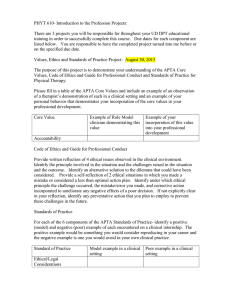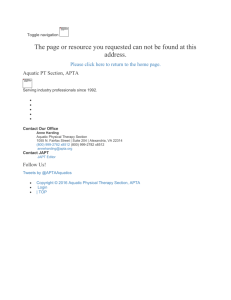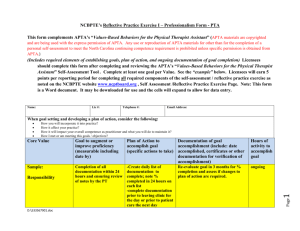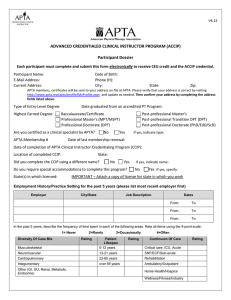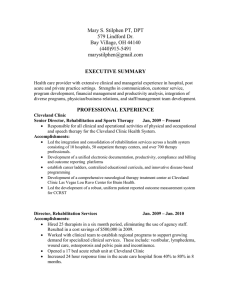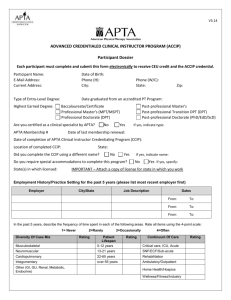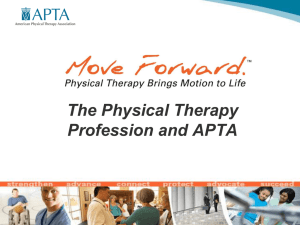Class of 2014 OnGoing Projects
advertisement
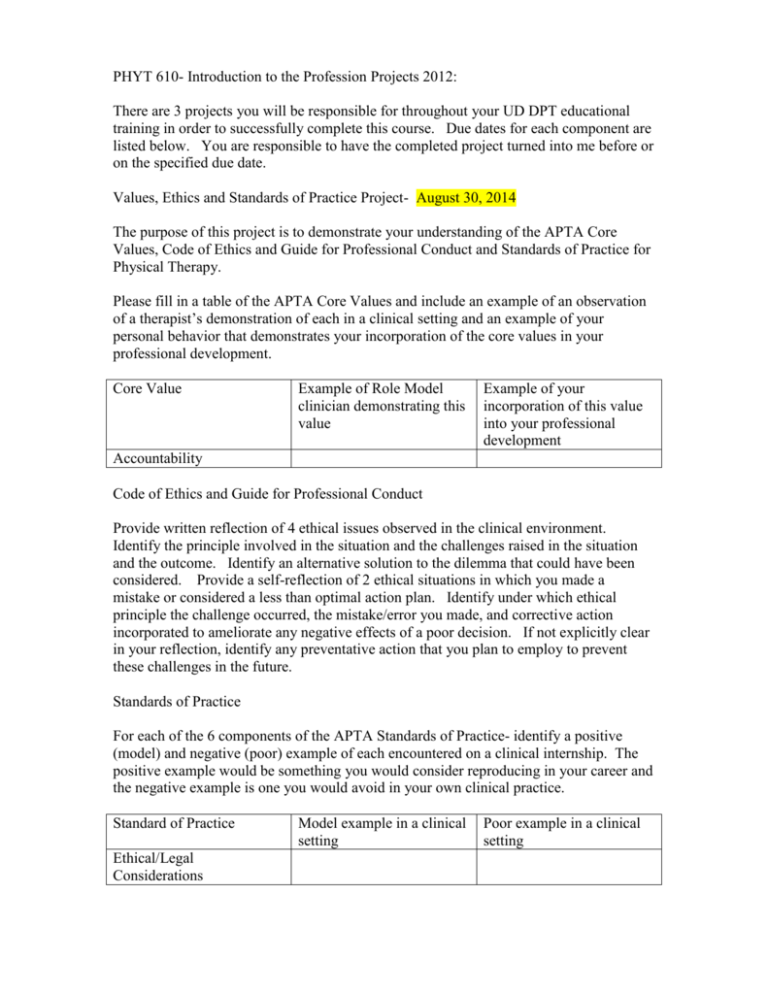
PHYT 610- Introduction to the Profession Projects 2012: There are 3 projects you will be responsible for throughout your UD DPT educational training in order to successfully complete this course. Due dates for each component are listed below. You are responsible to have the completed project turned into me before or on the specified due date. Values, Ethics and Standards of Practice Project- August 30, 2014 The purpose of this project is to demonstrate your understanding of the APTA Core Values, Code of Ethics and Guide for Professional Conduct and Standards of Practice for Physical Therapy. Please fill in a table of the APTA Core Values and include an example of an observation of a therapist’s demonstration of each in a clinical setting and an example of your personal behavior that demonstrates your incorporation of the core values in your professional development. Core Value Example of Role Model clinician demonstrating this value Example of your incorporation of this value into your professional development Accountability Code of Ethics and Guide for Professional Conduct Provide written reflection of 4 ethical issues observed in the clinical environment. Identify the principle involved in the situation and the challenges raised in the situation and the outcome. Identify an alternative solution to the dilemma that could have been considered. Provide a self-reflection of 2 ethical situations in which you made a mistake or considered a less than optimal action plan. Identify under which ethical principle the challenge occurred, the mistake/error you made, and corrective action incorporated to ameliorate any negative effects of a poor decision. If not explicitly clear in your reflection, identify any preventative action that you plan to employ to prevent these challenges in the future. Standards of Practice For each of the 6 components of the APTA Standards of Practice- identify a positive (model) and negative (poor) example of each encountered on a clinical internship. The positive example would be something you would consider reproducing in your career and the negative example is one you would avoid in your own clinical practice. Standard of Practice Ethical/Legal Considerations Model example in a clinical setting Poor example in a clinical setting Professional Portfolio Project: Due Dec 1, 2014 The purpose of this project is to provide you an opportunity to formulate a strategy for ensuring growth in the profession. This requires self-assessment(i.e. Reflection, Professionalism self assessment(provided as a resource in this class), Generic abilities, Clinic feedback sheets, CPI and New England Clinic Eval) and collection and synthesis of feedback from academic and clinical faculty [i.e. Generic abilities, CPI, New England Clinic eval form, lab practical feedback, advice, etc.] Using the APTA publication: PROFESSIONAL DEVELOPMENT, LIFELONG LEARNING, AND CONTINUED COMPETENCE IN PHYSICAL THERAPY HOD P05-07-14-14(Program 65) [Position] Identify your plan for professional development, lifelong learning and continued competence in physical therapy. Identify 4 areas in which you have collected information (at least 2 from other professional sources such as CI’s, faculty) that provided you insight into areas of focus for development. Identify the information received, how you interpreted the info, and the action plan you developed in response. Describe how the major assumptions in HOD P05-07-14-14 will be tackled in your first 3 years of practice. Then provide the plan you have developed and method of assessment you will use to determine if you are successfully accomplishing the 6 major opportunities described in the “Description of Professional Development” section of HOD P05-07-1414. Legislative Project: Due July 15, 2013 The purpose of this project is to provide experiential learning in local and national professional advocacy and health policy participation. To fulfill this project you must provide proof of attendance at 2 Physical Therapy Association Meetings/Events: National APTA activity or Student Conclave Activity or DPTA meeting or State Regulatory Board Meeting. In addition, You must identify and participate in one advocacy initiative aimed at patient unrestricted access to PT and/or inclusion of PT in health care plans. You must also plan and execute 1 contact with local, state or national officials regarding health policy issues. Grading policy- these projects are Pass/Fail. Pass is B or Above. A grade of C or below will be given 1 opportunity for correction within 2 weeks of receipt of grade. Failure to complete any project with a Pass on the second attempt will result in a Failing grade in the course. Late submissions are not accepted and result in a Failing grade for that component and thus a Failing grade for the course. Grades will be assigned as follows: A: All components of the project are present and the student’s responses demonstrate and understanding of the principles (90% or greater). B: Less than 20 % of the components are missing and the student’s responses demonstrate an understanding of the principles OR all components of the project are present but 75%- 89% of the evidence demonstrates understanding of principles. (If both Present- grade = C) C: 20%-30% of the components are missing OR 60%-74% of the evidence demonstrates understanding of principles (If both present, grade = D) D: 31%-40% of the components are missing OR 50%-59% of the evidence demonstrates understanding of principles (If both present, grade =F) F: Any performance below the level of D.
